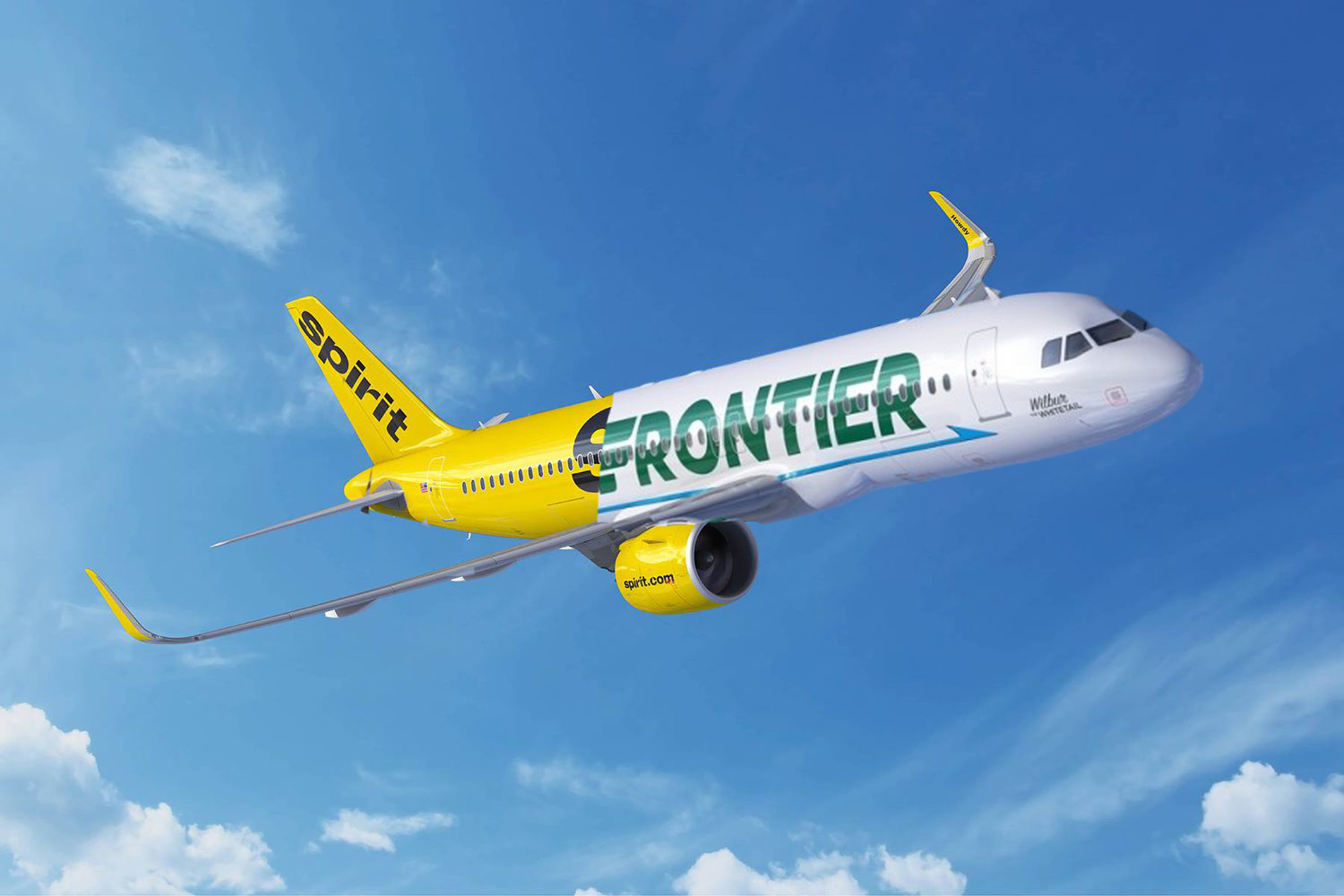
UPDATE: Bloomberg reports that a Frontier-Spirit merger is back on the table:
Bankrupt Spirit Aviation Holdings Inc. is in discussions to merge with Frontier Group Holdings, people familiar with the matter said.
A transaction could be announced as soon as this month, said the people, who asked not to be identified because the matter is confidential. The discussions are ongoing and could end without a deal taking place, they said.
Spirit and Frontier have been down this road before (in the past, Spirit wanted too much money), but we find ourselves in a different position now. Spirit defied naysayers and survived the weekend and has now unlocked another $100 million to push forward, but remains in a highly precarious position. Frontier is now well-positioned to snap up Spirit Airlines and create a nationwide budget carrier.
When I saw the news that Barry Biffle, Frontier’s longterm CEO, stepped down yesterday (or was forced out), my first thought was that he might pivot to Spirit. After all, Spirit needs bold leadership and Biffle was Chief Marketing Officer and an Executive Vice President at Spirit from 2005 to 2013. I thought Biffle could jump to Spirit, then help orchestrate a merger between the two, eventually returning to his old job at the helm of Frontier.
Mark this as developing…
Below is a story I wrote on October 23, 2024, the last time Frontier and Spirit talked about a merger. My analysis has not changed, with one exception. It has become somewhat clearer to me why U.S. budget carriers struggle while European budget carriers thrive: airports. Ryanair, in particular, is able to fly to secondary airports with much lower costs than major European airports. While Allegiant and Breeze have tried this in the USA, Frontier and Spirit fly to major airports like Los Angeles (LAX), Chicago (ORD), and New York (LGA/JFK), where costs are high.
When most of your ticket is simply government taxes and fees, there is not a lot of money on the table. But I’m rooting for Spirit and I’m rooting for Frontier. Having a nationwide budget carrier places pressure on legacy network carriers to match, and that benefits all consumers.
I’m pleased to see that Frontier Airlines is again exploring a merger with Spirit Airlines that could create a more powerful, nationwide budget carrier.
Report: Frontier And Spirit In Merger Talks Once Again
Even as Spirit Airlines explores bankruptcy, The Wall Street Journal reports Frontier and Spirit are again exploring a merger, though no announcement is imminent. In fact, it is far more likely that Spirit will enter bankruptcy protection in a necessary move to restructure crippling debt.
Even so, discussions have resumed between the two carriers after a judge determined JetBlue and Spirit could not merge. Any deal would be contingent upon Spirit successfully renegotiating its debt and restructuring its balance sheet, whether in Chapter 11 protection or out.
This Is A Merger I Could Support…
I’m generally averse to airline mergers of any kind because I think that consumers tend to lose, but we see so-called “ultra-low-cost-carriers” struggling in the USA post-pandemic world as consumers drift to full-service carriers, often at comparable pricing via basic economy fares.
And even I see value in them. Remember that recent Spirit carry-on bag incident I wrote about? Well, I had to get from Chicago to Newark and United wanted over $300 for a walk-up ticket. Spirit was $142 and I only had a personal item. For a 1.5-hour flight, I was happy to save the money and fly Spirit.
But Spirit finds itself in a very different and weakened state and consumers appear to be both rejecting Spirit and more carefully packing, such that the ancillary revenue continues to drop as consumers wise up to the business model and leave larger carry-on bags at home.
Speaking more broadly, we see great success with this sort of business model in Europe, with Ryanair and EasyJet offering valuable connectivity and competition against European legacy carriers. I don’t understand what makes US markets so different, but I see a place for budget carriers and I see the latest desperate attempts by both Spirit and Frontier to become more “premium” or “full service” as going against the business model they need to distinguish themselves from network competitors.
CONCLUSION
While I don’t know what the future holds for budget carriers like Frontier or Spirit in the USA, I think there is a valuable place for them in the market and that the complementary route networks, aircraft overlap, and the need to scale operations to achieve profitably all make a marriage between the two far more likely and worthy than the JetBlue – Spirit tie-up.
In the end, these carriers hold other accountable and open up air travel to more folks. That is a good thing.




This is why I think LCCs work in Europe and Asia, but not in the US:
Imagine sitting in Birmingham (or Berlin, or Oslo) on a Monday. You realize you’ve got nothing going on this weekend, so you book a £19 ticket to AGP (or MAD, or LCA). You have a multitude of hotels to choose from under £50/nt, meals and drinks are affordable, and there is public transportation when you arrive. You can afford it.
Imagine sitting in St Louis (or Pittsburgh or Salt Lake City). It’s Monday, and you book a $49 flight to TPA (or MSY or SAN). Hotels cost hundreds of dollars, you probably need a car or at least several costly Ubers, and dining costs a ton. You can’t afford it.
In Europe (and Asia) LCCs create demand that wouldn’t others exist. In the USA they displace demand from other carriers, or serve as a cheaper option (as in your example). The act of traveling away from one’s home in the US just isn’t affordable for most people once or twice a year.
You are spot on.
Interesting premise that’s worth some thought although why ULCC’s in Europe would restrict themselves to secondary and tertiary markets and ignore larger markets where even siphoning off a small portion of existing business would help their bottom line remains a consideration.
While they fly out of secondary and tertiary markets, that’s certainly not all they do. Look at EasyJet’s destinations out of CDG. They fly everywhere! Many destinations, like MXP, LIN, MAD, LGW, CPH) surely grab a fair amount of biz travel. Though personally, if it were me, I’d stick with AF.
Even RYR has moved into primary airports alot – Brussels, Malpensa, BCN and FCO are four which immediately come to mind. EZY has generally avoided secondary airports (except London) from the get-go.
This is America Jack! We invented flying! I dont care about no candy ass euros! Whatever we do in America, it’s just better!
Indeed. Keep in mind also our geography.
Seattle to New York is about the same distance as London to Sofia, Bulgaria.
The Ryanair model assumes shorter stage lengths for trips allowing more flights per day per aircraft.
Plus, those shorter trips mean passengers can put up with 200-seat MAX 8’s.
But I think your observation that leisure travel is so much different in Europe because of other factors that have nothing to do with the airline part of it is dead on and a neglected piece of the puzzle.
consumers drift to full-service carriers, often at comparable pricing via basic economy fares.
—————–
I have looked at Delta and American fares. I don’t see the major airlines matching Frontier’s fares. They are usually double, sometimes triple. Right now, fares from New York to Atlanta is about $39 one way with about a 14 to 21 advance purchase. Could someone show me a similar Delta one way fare?
DL regularly serves it for $69. I get that this is $30 more than Frontier, but if you have any sort of desire to fly Delta, that’s hardly a bad price.
I understand. Pay a little extra for the Delta experience. I’m looking at a fare right now from New York- LaGuardia to Atlanta with Frontier on November 5th. It’s $29 one way. No internet and a hard plastic seat for two hours. Im just going to bring my seat cushion and deal with it.
@Emily: to be clear, the prices are never identical, but if you throw in carry-on bag, wi-fi, drink, snack…it can come out about the same. That’s my point.
My main issue with a potential merger would be that Frontier is arguably far worse than Spirit so the combined airline would just be a bigger Frontier.
I would imagine that we would see wi-fi come to Frontier fleet, at a minimum.
Not sure what else is different…I think they are both terrible but may be worth the price in some circumstances.
Spirit has come a long way from the days when they awarded ff miles to people for sharing their horrific passenger experiences with the public. Spirit really improved things and has the Big Front Seat which would go away under the control of Frontier.
I don’t know what is more of a fetish among certain people: Big Front Seat or Mint. They’re both Domestic First overblown by people who haven’t used it.
Matt
You mention Chapter 13 bankruptcy in the above article. I believe 13 is for individuals.
I believe Chapter 11 is for businesses.
TWA had the distinction of filing for chapter 11 on three separate occasions which gave new meaning to the term Chapter 33.
You are quite right!
But if people are trending away from LCCs to full service and legacy airlines, how will this merger reverse the trend? What will the merger offer people to choose the newly merged airline?
Nice update, Matt, however, we know nothing so far. Biffle’s ouster could’ve been because he was fighting to keep the headquarters for any new potential merged airline in Colorado, whereas, the tax-cheats and anti-labor elements would certainly prefer Florida (Spirit’s headquarters), because, you know, the typical profits over people stuff. Anyhoo…
Dum vita est spes est (Where there is life, there is hope)! Best of good luck to both Spirit and Frontier!
Let’s remember that Frontier’s leadership under former CEO Barry Biffle had been cautious about a full acquisition of Spirit, on concerns that absorbing Spirit could strain its balance sheet…
The combined debt load of nearly $12 billion combined with the operating losses both airlines are taking, as well as the merger costs have more to do with what’s stopping a merger than someone with a name that sounds like it’s from a old Superman comic.